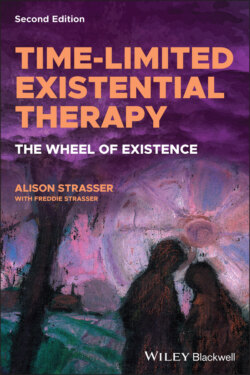Читать книгу Time-Limited Existential Therapy - Alison Strasser - Страница 13
Existentialism and Phenomenology Overview
ОглавлениеExistentialism and phenomenology are different and yet complementary philosophies that attempt to understand what it means to be human. In simple terms, existentialism focuses on human existence, reflecting on the issues of what it is to be human, while phenomenology concerns itself with how human beings subjectively interpret their existence. These philosophies stem not from a traditional, objective, rational, scientific focus or impetus but from an examination of how humans understand themselves in the midst of their lived experience.
The word ‘existence’ has its roots in the Latin word ex‐istere – translated variously as ‘to stand out’, ‘to emerge’, ‘to proceed forward in a continuous process’.
Rollo May, the distinguished American protagonist of existential philosophy, defined this existential approach to understanding the human condition in his book The Discovery of Being:
For the very essence of this approach is that it seeks to analyse and portray the human being – whether in art or literature or philosophy or psychology – on a level which undercuts the old dilemma of materialism versus idealism. Existentialism, in short, is the endeavour to understand man1 by cutting below the cleavage between subject and object that has bedevilled Western thought and science since shortly after the Renaissance.
(May, 1983, p. 49)
Existential philosophy is concerned with the science of being – with ontology (Gk ontos, ‘being’). It examines the attitudes we adopt towards being and what we can do about it. Existential philosophy observes that each individual makes his or her own unique pathway in the world, that each of us will experience our own existence in our own distinctive manner. Simultaneously, each individual exists in a relational or co‐constituted mode to others and to the world. In other words, as soon as we exist we are inexorably connected to other people, objects and even ideas.
Kierkegaard, the grandfather of existentialist philosophy, explored the anxiety and aloneness humans experience as they struggle in their attempts to find their own truth, their personal freedom, against the backdrop of the ‘shoulds’ and ‘oughts’ that life inevitably demands. Heidegger pertinently asked, ‘What is it to be human?’ and spent his life’s work defining and redefining both his questions and answers, emerging with the concept that humans are inextricably connected to the world, are perpetually in a state of ‘being‐in‐this‐world’, known as Dasein (Heidegger, 1962). Similarly, we are always ‘comporting’ or choosing how we act in the world at the same time as the world interacts with us.
Many people associate existential philosophy with complicated ideas and a leaning towards pessimism. They hear words such as ‘death’, ‘isolation’, and ‘meaninglessness’, without realising that these concepts form only a part of a richer and more complex whole. It is just as significant, for example, to explore hope as it is to examine despair. The polarity of existential themes creates the constant tension between life and death, meaning and meaninglessness, isolation and relationship. Existence is about understanding and living within these constant tensions.
Phenomenology, on the other hand, concerns itself with subjectivity, with how human beings interpret things to themselves (Husserl, 1977) as opposed to the natural science framework that seeks to find objective truth. The importance of phenomenological exploration is that it excludes this objective reality and instead seeks a subjective explanation of the individual’s relationships with objects, others, and his or her sense of being.
